Before Ben and Melody Pahlow were married, she had several stipulations. Mrs. Pahlow did not want any children, to be a pastor’s wife or be a missionary in Africa. Mr. Pahlow agreed to every condition, and in April 1989, the high school sweethearts wed in Chicago.
Fast-forward several decades and the Pahlows are now proud parents of four. Since 2003, the Frisco residents have been impacting lives halfway around the world through their ministry, Africa Family Rescue.
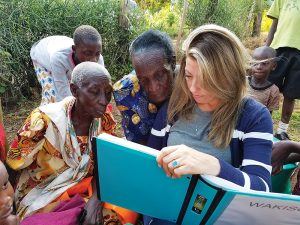 “She said she did not want kids. I was upset because I wanted 10. Then, she said she would never be a pastor’s wife,” Mr. Pahlow shares. He decided to go to business school and the Air Force. Then, Mrs. Pahlow said she would never be a missionary in Africa. Mr. Pahlow says, “I was like, so what? I do not want to be one either. Never say never to God, I guess.”
“She said she did not want kids. I was upset because I wanted 10. Then, she said she would never be a pastor’s wife,” Mr. Pahlow shares. He decided to go to business school and the Air Force. Then, Mrs. Pahlow said she would never be a missionary in Africa. Mr. Pahlow says, “I was like, so what? I do not want to be one either. Never say never to God, I guess.”
Mr. Pahlow spent six years in the Air Force, and after serving at the Miss. Keesler Air Force Base, he returned to Chicago and enrolled at Northern Illinois University. While he worked and attended NIU, Mrs. Pahlow home-schooled their children, leading to a life-changing encounter.
A Fateful Meeting
In 2002, Mrs. Pahlow was at a local library. As she was leaving, a man asked her for a ride in broken English and she agreed. “That is not like me. He lived not far from us and we dropped him off,” Mrs. Pahlow shares.
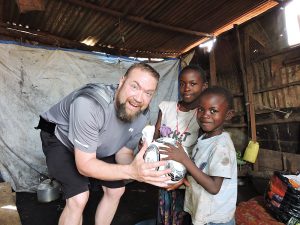 His name was Providence, which means “the protective care of God.” Providence was a refugee from Rwanda, the site of a bloody civil war between 1990-1994 and genocide. After Mr. Pahlow met Providence later that day, the Pahlows invited him to dinner. “We did not know anything about Rwanda,” Mrs. Pahlow says. “We actually did not even have a television. He spoke four languages, so he was quick at picking up English. As he started sharing what happened in Rwanda, we were appalled. A million people died in three months.”
His name was Providence, which means “the protective care of God.” Providence was a refugee from Rwanda, the site of a bloody civil war between 1990-1994 and genocide. After Mr. Pahlow met Providence later that day, the Pahlows invited him to dinner. “We did not know anything about Rwanda,” Mrs. Pahlow says. “We actually did not even have a television. He spoke four languages, so he was quick at picking up English. As he started sharing what happened in Rwanda, we were appalled. A million people died in three months.”
The Pahlows invited Providence to live in their basement, where he stayed for three years. As Providence continued learning English, they learned more about Rwanda and wanted to help. “He would teach us about poverty in Rwanda. I was making good money and we wondered what we could do to help even 10 families,” Mr. Pahlow says. “Providence emailed his uncle, who is a doctor in the villages, and got 10 photos. On Christmas Eve, we got 220 photographs of the poorest families I have ever seen. These were entire families, mostly orphans, with nobody to help them. They were in remote villages. We did not know what to do.”
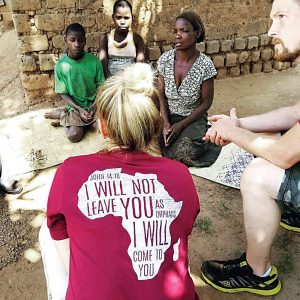 While Providence was living in their basement, Mr. Pahlow remembers Mrs. Pahlow returning from a Bible study and telling him they would be taking in several Somali refugees from the Bantu ethnic minority group through World Relief, an international relief agency.
While Providence was living in their basement, Mr. Pahlow remembers Mrs. Pahlow returning from a Bible study and telling him they would be taking in several Somali refugees from the Bantu ethnic minority group through World Relief, an international relief agency.
Imagine their astonishment upon arriving at the airport to pick up their new houseguests only to find that the group, which had been in a Kenyan refugee camp, was 22 people.
The Pahlows moved into their basement alongside Providence and gave their new guests the first floor of their home. “They did not know anything. They did not have diapers,” Mrs. Pahlow shares. “They had never seen stairs, electricity, an oven or lights, so we had to teach them every little thing.”
Taking the Next Step
Armed with a PowerPoint presentation featuring Rwandan families, the Pahlows made their pitch at 10 churches in the Chicago area, but collected zero donations. In fact, the final pastor they met with told Mr. Pahlow their efforts needed a more personal touch. In other words, the Pahlows needed to show they were actively involved by being in Africa.
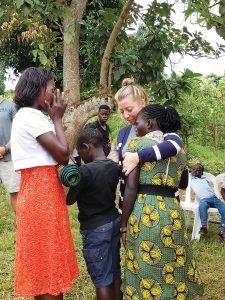 So, Mr. Pahlow formulated a plan for a three-week discovery trip to Rwanda, without their children, at a cost of $6,200. Even after selling their wedding rings, they remained $200 short.
So, Mr. Pahlow formulated a plan for a three-week discovery trip to Rwanda, without their children, at a cost of $6,200. Even after selling their wedding rings, they remained $200 short.
However, on the Friday before they were scheduled to leave, a Korean woman (who neither of them knew) knocked on their front door and handed them an envelope. Inside was a $200 check.
That first trip to Africa proved eventful. Towards the end of that trip, Providence’s uncle took the Pahlows to a village to meet a widow — another meeting that proved fateful.
“The miracle of God here is the woman he first took us to see. She was the most important widow of our 220 photos. She had grabbed Melody’s heart and she had put the woman’s photo on her desktop,” Mr. Pahlow said.
The Pahlows gave the woman, who had lost her entire fortune during the Rwandan Civil War, two goats to start a microbusiness — a simple gesture which quickly overwhelmed her and Mrs. Pahlow. “I told her ‘Jesus loves you,’” Mrs. Pahlow says. “I remember, suddenly, the entire world just disappeared. It was pouring rain. I am almost half-deep in mud in the middle of this village where these people are not even wearing shoes, do not have running water or electricity. I looked at Ben and I said ‘I am home.’ I just suddenly felt like I was at peace.”
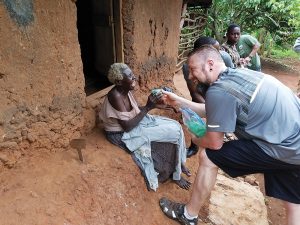 Since then, the Pahlows have made approximately 20 trips to Africa, raising their children there while helping people in Rwanda, Tanzania and currently in Uganda. Their organization has helped 800 families by building 150 homes for widows and orphans, refurbishing 20 wells to provide clean water, distributing 5,000 life-saving mosquito nets and thousands of animals.
Since then, the Pahlows have made approximately 20 trips to Africa, raising their children there while helping people in Rwanda, Tanzania and currently in Uganda. Their organization has helped 800 families by building 150 homes for widows and orphans, refurbishing 20 wells to provide clean water, distributing 5,000 life-saving mosquito nets and thousands of animals.
Since 2015, the Pahlows have attended Frisco-based Hope Fellowship church, which partners with their organization to help defray monthly expenses. “When someone is hungry, hurting and alone, it is sometimes difficult to hear about the love of Christ. The Pahlows have opened the hearts of those individuals and families in Uganda to hearing about God’s love. By bringing transformation, helping to provide homes, jobs and education, they enrich the lives of those they have met,” says Launa Vaughn, the missions pastor at Hope Fellowship. “Their hearts are so full of love for the Africans they serve.”
Considering one of Mrs. Pahlow’s pre-marriage stipulations was that she would never be a missionary to Africa, even she finds it ironic that God had other plans for her family. “I feel so honored to be an ambassador for women and children who have absolutely no way to stand up on their own and say what they need. Ben and I give them a voice,” she says. “It is so powerful. I used to think being a missionary would be so much work. I certainly felt like it was going to be so hard, but it feels like it fits me. It is so easy for me to stand up and say a woman needs something. People have responded in Texas like I have never seen. People in Texas refuse to let people who are broken suffer. If there is a way they can help, we have seen it happening. It blows my mind.”
For more information about Africa Family Rescue, visit africafamilyrescue.org.







